Hello Movies & TV Shows community
Film history is filled with masterpieces that shaped their times and worked both as propaganda for the ideological spread at the time they were published, it is weird to see comedy in their annals and even less with the satirical ones, as the very nature of satire is less effective on that way of influence, because they work on a reactive way, and it limits itself to assault some idea or entity, making it an underhanded method to reach the same highs as the other masterpieces, and that is the achievement of Charles Chaplin with The Great Dictator (1940).
Charles Chaplin used humanity as a way to connect the conditions of their time with comedy and express the humanity and lack of it during a time we would like to forget, WW2 and the Aryanization of Germany. Chaplin as a master of silent comedy knew that his film, The Great Dictator (1940), would act like a bridge between satire (comedy) and the inhuman acts of Hitler and its supporters, so he decided to do it tactfully and in-depth, as he was neither Jew nor Nazi, he was nothing but a human being watching the conflict from afar.
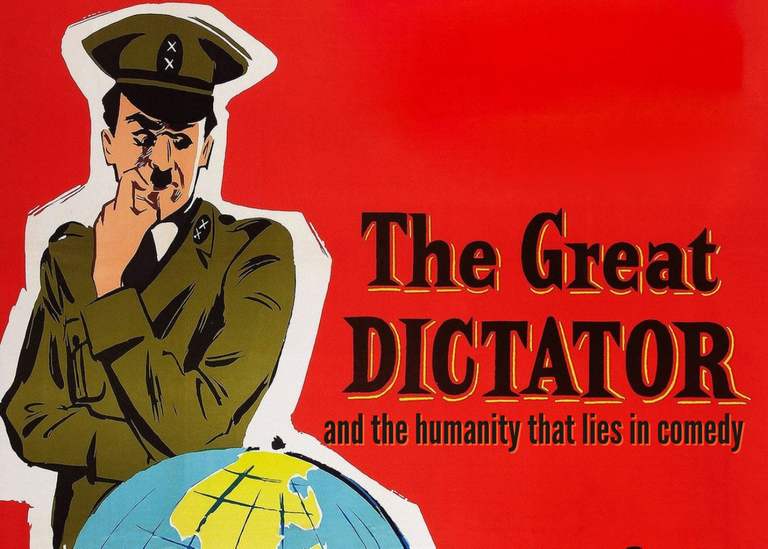
Provided by Rottentomatoes Modified by me on Canva.
The line said by the owner of the laundry in the film, "You are so used to bad times, you can't live without them" sets the tempo of this film and its influence on the viewer, as it defines the human condition as one of survival, always one step behind of change, nature, politics or economy, always on the edge of effort and strife.
This is part of our reality, one way or another humanity has always been a species formed by effort and strife, at the start we fought the wolves, bears, and other big predators. Later in our development, we started assaulting other groups or tribes of humans for easy exploitation of resources, and eventually, we reached 1940 and the great war made a return to mankind, the magnificent vendetta for the end of the German Empire.
The fall of the German Empire would set the bases of the worship of the past in the film, as we see the character of "A Jewish Barber" being stuck in the time before the fall secluded in a mental facility until it was finally allowed to escape for unknown reasons, he was the same as the Germany of his time, intoxicated with the medicine of the past and dreaming with an empire that was never as good as it is remembered, he was a representation of why it happened, as he represents how Germany was stuck into strife no matter how much effort they did to get out of it.
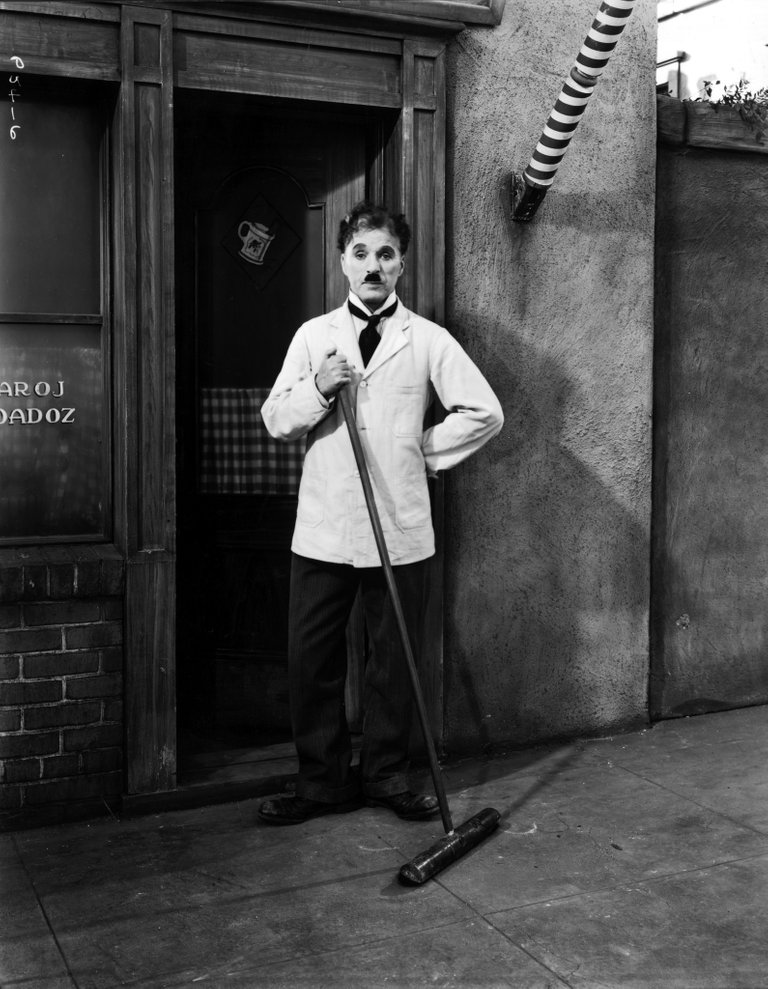
Provided by Imdb.
From a philosophical point, human nature is divided, we are neither evil nor good, and we are capable of a wide arrangement of acts that would span from one side to the other as a species, so why do I say we are divided? This division is between acts of humanity and inhumanity, being kind to others or not, that is the real division of human nature.
We are limitless in our potential to grow and change to the point that we inherently create conflicts with our species, we usually become kind to our group or nation and unkind to others, the past world war is evidence of it and at the time of recording this film, it was the latest example of it, as the great war came before and the event is part of the plot to a point.
Charles Chaplin took a big step toward cinematic history when he decided to influence the political playground of its time with its small Jewish barber, this move was unprecedented for a satire film and an example of it came from the speech at the end of the film, he sent a clear message of humanity and democracy that was too strong for most people and built one of the best monologues on film history.
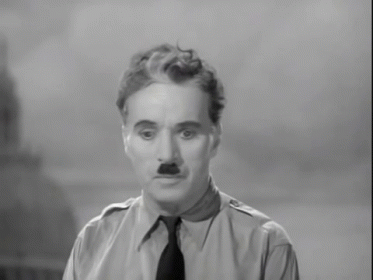
Provided by Tenor.
With time, we are all somehow drawn upon humanity or inhumanity, as is part of the human condition, most human beings would like to help others, but some people would only like to help themselves and their group or nation, that is human nature, to either be kind or selfish, there is no in between, and eventually they are hard to separate or notice.
Sometimes someone that is deemed as a hero is selfish, he has saved his nation or family but by doing so he has hurt more than the amounts he had saved, that is logical, it happens, but is part of human nature, and few films touched that as this one did, the great dictator was in nature selfish and cruel, but he was kind to "his people", unkind to others, but that was how he remained in power as a mad power-hungry man.
Talking about the dictator, I would argue that he abused constantly both his men and others, he dehumanized himself to a point he never actually notices that he has become a monster, and his dream of global domination turned him into a monster because he seriously thought that he was helping "his people" so he let go of his moral dilemma about the damage caused to others and became a total despot.

Provided by Tenor.
There is a prelude to humanity in this film, Chaplin made sure we could all notice it, as he included the initial scene of the barber participating in the war, he was shown to be funny, a terrible soldier, and very reasonable on the context, doing his best to the scarce level of his ability, he was a common soldier that managed to save lives by random chance and had the aim of a blind man.
With this prelude we can easily see how brave yet powerless was the barber, and how that translate as a sideshow of the Dictator as both of them are represented by Chaplin himself, one was full of power and capacity but had no heart at all, the other had neither of those capabilities but a hearth of gold, with that silver lining, as soon as they changed positions, he managed to change and disband the troops, or at least, declare it.
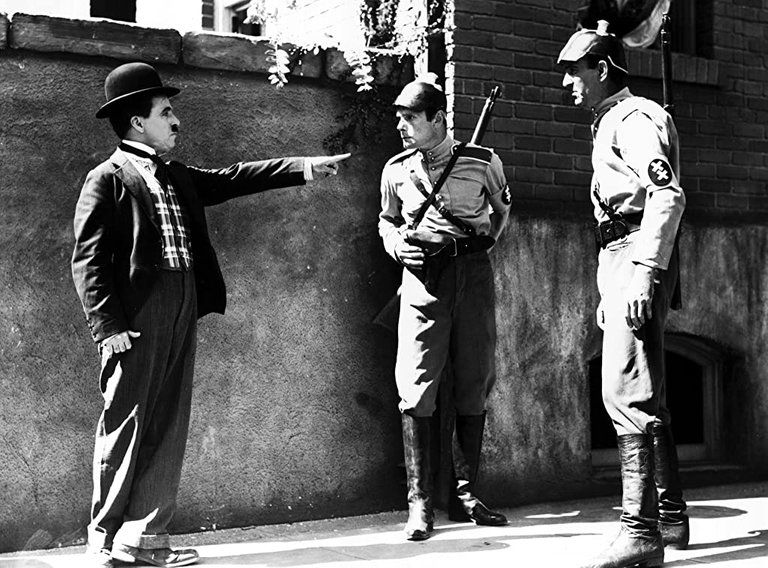
Provided by Imdb.
By the time the final speech has ended, one is left shaken by the words that came to be thought by Charles Chaplin, he had created a marvelous film that managed to do something so hard with a subject that was life and rolling at the time, dictators were abundant and in fact, the film points it out with the addition of the character Napoloni. The final speech asked for a vibrant society, that was watchful to said dictators and worked to avoid them actively, in other words, people for democracy, people that protected the future of mankind, in other words, humanity at its finest example.
All of this while still being a comedy film, that used satire to the point of nonsense, even the gibberish language used in some scenes is cutting edge on how nonsensical a film could be made to be at its time, and showed us the true talent of Chaplin, as he protested a horrible reality using the magic of comedy.
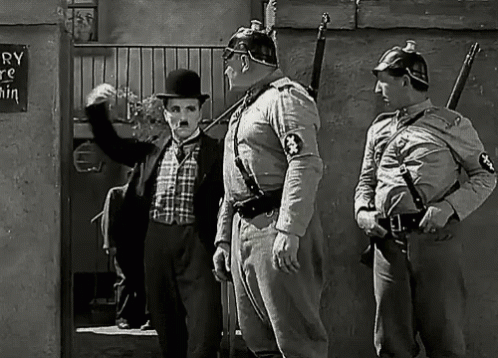
Provided by Tenor.
Time sure served this jewel to perfect itself, as most of its passing has shown us how right this film was on its calling, democracy has become normal, yet is very fragile in the world and easy to be broken and taken away by modern slavers, making this film as important and relevant to this era as it was in 1940 If you don't mind me asking, Have you ever considered what the world would be without democracy? I will read you in the comments section below.

¡Hola comunidad de Movies & TV Shows!
La historia del cine está llena de obras maestras que marcaron su época y funcionaron como propaganda para la difusión ideológica en el momento en que fueron publicadas, es raro ver la comedia en sus anales y menos aún del genero satírico, ya que la propia naturaleza de la sátira es menos efectiva en esa forma de influencia, porque funciona de forma reactiva, y se limita a agredir alguna idea o entidad, convirtiéndola en un método solapado para llegar a las mismas cotas que las otras obras maestras, y ese es el logro impresionante de Charles Chaplin con El Gran Dictador.
Charles Chaplin utilizó la humanidad como una forma de conectar las condiciones de su tiempo con la comedia y expresar la humanidad y la falta de ella durante una época que nos gustaría olvidar, la Segunda Guerra Mundial y la arianización de Alemania. Chaplin, como maestro de la comedia muda, sabía que su película, El gran dictador (1940), actuaría como un puente entre la sátira (la comedia) y los actos inhumanos de Hitler y sus partidarios, por lo que decidió hacerlo con tacto y profundidad, ya que no era ni judío ni nazi, no era más que un ser humano que observaba el conflicto desde la distancia.
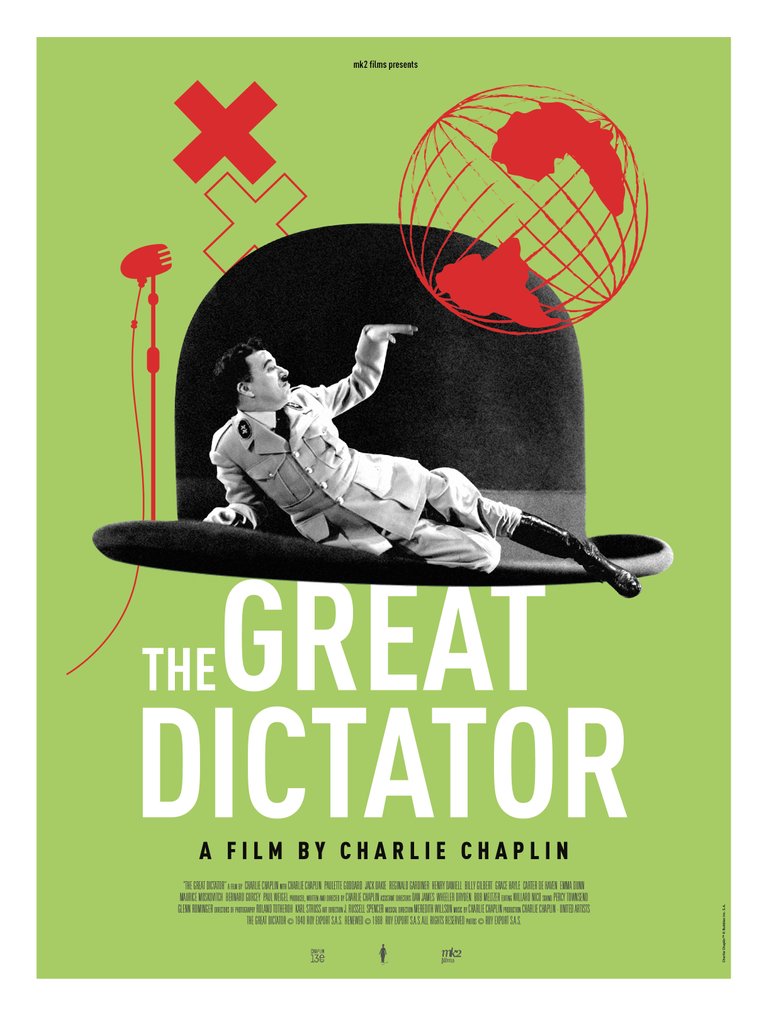
Provisto por Imdb.
La frase que dice el dueño de la lavandería en la película, "Estás tan acostumbrado a los malos tiempos, que no puedes vivir sin ellos" marca el ritmo de esta película y su influencia en el espectador, ya que define la condición humana como una de supervivencia, siempre un paso por detrás del cambio, de la naturaleza, de la política o de la economía, siempre al borde del esfuerzo y la lucha.
Esto es parte de nuestra realidad, de una forma u otra la humanidad siempre ha sido una especie formada por el esfuerzo y la lucha, al principio luchábamos contra los lobos, los osos y otros grandes depredadores. Más tarde en nuestro desarrollo, empezamos a agredir a otros grupos o tribus de humanos para la fácil explotación de los recursos, y finalmente, llegamos a 1940 y la gran guerra volvió a la humanidad, la magnífica vendetta por el fin del Imperio Alemán.
La caída del Imperio Alemán sentaría las bases del culto al pasado en la película, ya que vemos al personaje de "Un barbero judío" estar atrapado en la época anterior a la caída recluido en un psiquiátrico hasta que finalmente se le permitió escapar por razones desconocidas, él era igual que la Alemania de su época, embriagado con la medicina del pasado y soñando con un imperio que nunca fue tan bueno como se recuerda, él era una representación de por qué sucedió, ya que representa cómo Alemania estaba atrapada en la lucha, a pesar del esfuerzo que hicieran para salir de ella.
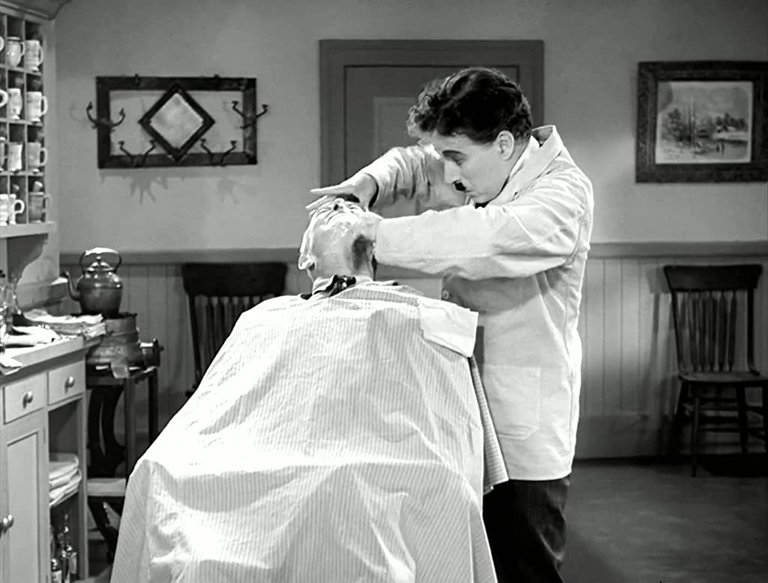
Provisto por Imdb.
Desde un punto de vista filosófico, la naturaleza humana está dividida, no somos ni malos ni buenos, y somos capaces de una amplia disposición de actos que abarcarían de un lado a otro como especie, entonces ¿Por qué digo que estamos divididos? Esta división es entre actos de humanidad e inhumanidad, ser amable con los demás o no, esa es la verdadera división de la naturaleza humana.
Somos ilimitados en nuestro potencial para crecer y cambiar hasta el punto de que inherentemente creamos conflictos con nuestra especie, solemos ser amables con nuestro grupo o nación y poco amables con los demás, la pasada guerra mundial es una prueba de ello y en el momento de grabar esta película, era el último ejemplo de ello, ya que la gran guerra vino antes y es evento en parte de la trama hasta cierto punto.
Charles Chaplin dio un gran paso hacia la historia del cine cuando decidió influir en el terreno político de su época con su pequeño barbero judío, este movimiento fue inédito para una película de sátira y un ejemplo de ello fue el discurso del final de la película, envió un claro mensaje de humanidad y democracia que fue demasiado fuerte para la mayoría y construyó uno de los mejores monólogos de la historia del cine.
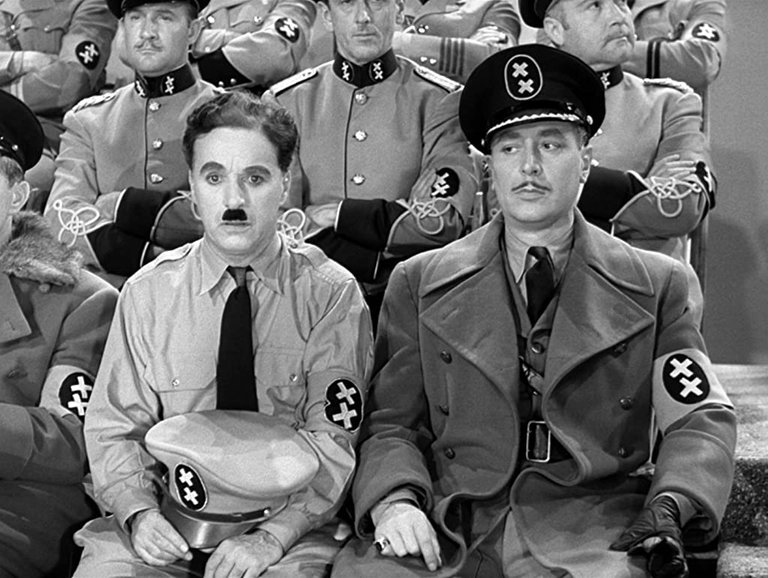
Provisto por Imdb.
Con el tiempo, todos nos sentimos de alguna manera atraídos por la humanidad o la inhumanidad, como es parte de la condición humana. La mayoría de los seres humanos les gustaría ayudar a los demás, pero a algunas personas sólo les gustaría ayudarse a sí mismos y a su grupo o nación, esa es la naturaleza humana, ser amable o egoísta, no hay un término medio, y finalmente son difíciles de separar o notar.
A veces alguien que se considera un héroe es egoísta, ha salvado a su nación o familia pero al hacerlo ha hecho más daño que las cantidades que había salvado, eso es lógico, sucede, pero es parte de la naturaleza humana, y pocas películas tocaron eso como lo hizo esta, el gran dictador era por naturaleza egoísta y cruel, pero era amable con "su gente", poco amable con los demás, pero así fue como se mantuvo en el poder como un loco hambriento de poder.
Hablando del dictador, yo diría que abusó constantemente tanto de sus hombres como de los demás, se deshumanizó hasta un punto en el que nunca se dio cuenta de que se había convertido en un monstruo, y su sueño de dominación global lo convirtió en un monstruo porque pensaba seriamente que estaba ayudando a "su gente", así que dejó de lado su dilema moral sobre el daño causado a los demás y se convirtió en un déspota total.
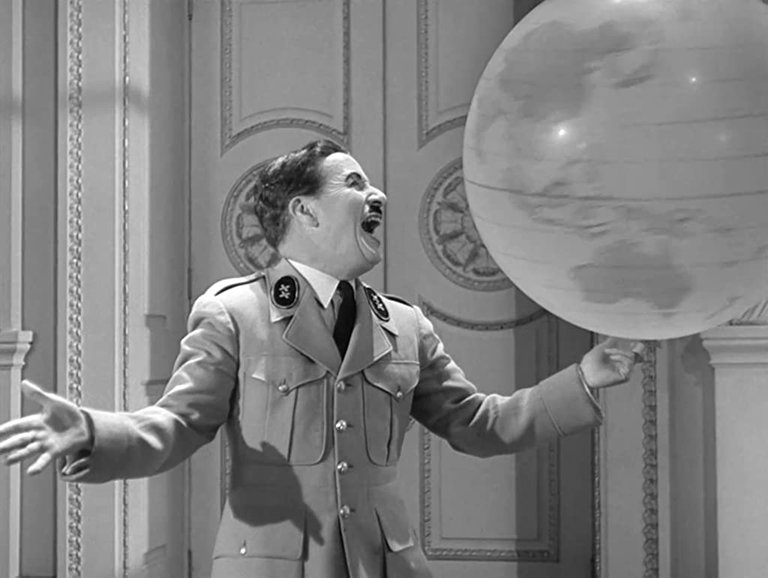
Provisto por Imdb.
Hay un preludio de humanidad en esta película, Chaplin se aseguró de que todos pudiéramos notarlo, ya que incluyó la escena inicial del barbero participando en la guerra; se le mostraba divertido, era un terrible soldado y muy razonable en el contexto, haciendo lo mejor al escaso nivel de su capacidad, era un soldado común que lograba salvar vidas por azar y tenía la puntería de un ciego.
Con este preludio podemos ver fácilmente lo valiente y a la vez impotente que era el barbero, y cómo eso se traduce como un complemento del Dictador ya que ambos son representados por el propio Chaplin, uno estaba lleno de poder y capacidad pero no tenía corazón alguno, el otro no tenía ninguna de esas capacidades pero sí un corazón de oro, con ese resquicio de esperanza, en cuanto cambiaban de posición, conseguía cambiar y disolver las tropas opresoras, o al menos, declararlo.
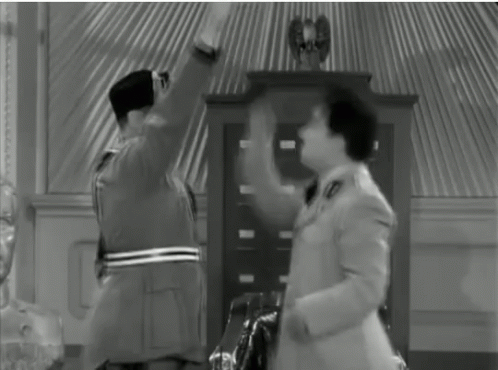
Provisto por Tenor.
Para cuando el discurso final ha terminado, uno se queda estremecido por las palabras que llegó a pensar Charles Chaplin, había creado una película maravillosa que consiguió hacer algo tan grandioso con un tema que era la vida y momento de la época, los dictadores abundaban y de hecho, la película lo señala con la incorporación del personaje Napoloni. El discurso final pedía una sociedad vibrante, que estuviera atenta a dichos dictadores y trabajara para evitarlos activamente, gente por la democracia, gente que protegiera el futuro de la humanidad, es decir, la humanidad en su mejor ejemplo.
Todo ello sin dejar de ser una película de comedia, que utilizaba la sátira hasta el disparate, incluso el lenguaje inventado utilizado en algunas escenas es vanguardista en cuanto a lo disparatado que podía ser un filme en su época, y nos mostraba el verdadero talento de Chaplin, al protestar contra una realidad horrible utilizando la magia de la comedia.

El tiempo seguro que sirvió a esta joya para perfeccionarse, ya que la mayor parte de su paso nos ha mostrado lo acertado de esta película en su llamamiento, la democracia se ha convertido en algo normal, sin embargo es muy frágil en el mundo y fácil de ser rota y arrebatada por los esclavistas modernos, lo que hace que esta película sea tan importante y relevante para esta época como lo fue en 1940, si no te importa que te pregunte ¿Te has planteado alguna vez lo que sería el mundo sin democracia? Te leo en la sección de comentarios más abajo.
La fuente del separador entre ingles y español, Source basada en el poster promocional del filme provisto por Imdb.
The rewards earned on this comment will go directly to the people( @jesustiano ) sharing the post on Twitter as long as they are registered with @poshtoken. Sign up at https://hiveposh.com.
Lamentablemente el mensaje no hizo efecto en le mundo, ni en ese momento y menos ahora, ya que todavía las políticas dictatoriales son mas comunes , incluso en los países donde supuestamente hay democracia. Los extremistas, del ando que sean , izquierda o derecha, estan tomando posiciones de poder en muchas partes del mundo. ¿hacia donde vamos? Por cierto, me hiciste recordar las películas que hacían en Hollywood durante la era Reagan, als cuales tenían una línea ideológica y propagandístico fuerte
Es que esta es un predecesor de la era Reagan, dígame Red Dawn hahaha xD, es que el mensaje resulto ser muy fuerte, muy directo y muy humano, el problema es que el hombre es tan egoísta como es humanitario, por ende nadie quisiera el bien del ajeno y buscara solo el bien de los suyos, llevando a dictaduras inevitablemente, las masas no se han alzado, tampoco han luchado para evitar el control ni mucho menos el doblegamiento por la fuerza, si bien casos como Sri Lanka ocurren, tambien ocurren casos como Putin o la china comunista...
Realmente la democracia nunca ha nacido del todo, es solo un ideal que estamos aun pendientes por realizar, Ni eeuu es una democracia per se, con su sistema electoral del desastre y lo facil que es ganar siendo populista, como lo hizo Trump.
La direccion a la que va la humanidad es obvia, al progreso, tras una tercera guerra mundial. De nuevo vendra una epoca oscura donde la tecnologia crecera de forma hiper acelerada, tendremos una decada de bombas y tiros y terminara probablemente con alguna A-bomb de primera clase... Llevandonos a otra epoca similar reitereadamente, la humanidad como seres que somos, repetimos un patron ciclico y eso es mas que evidente...
Yay! 🤗
Your content has been boosted with Ecency Points, by @jesustiano.
Use Ecency daily to boost your growth on platform!
Support Ecency
Vote for new Proposal
Delegate HP and earn more
Thanks Ecency :D